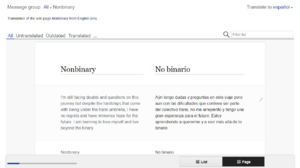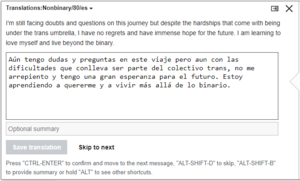Nonbinary Wiki:Translations
| |
Ondo is working on this article right now, so parts of the article might be inconsistent or not up to our standards of quality. You are welcome to help, but please ask in the talk page before performing significant changes to this page. Note to editors: If this notice stays here for more than two weeks, feel free to replace it with {{incomplete}} or a similar maintenance template. |
How to translate
Only registered users can translate articles. Make sure to create an account before following this guide!
Access the page Special:PageTranslation to check which articles are marked for translations. Not all articles in the wiki are marked for translation, but if you want to translate a specific page that is not listed, request it in the talk page. A translation admin will take a look at the request and probably accept it.
To translate a page, click on the small Translate this page link that is displayed at the very top of the article content. This will take you to the translation interface:
Choose the Untranslated tab (or the Outdated one if you want to update old translations). Click on each segment and translate it to your chosen language in the text box! You can optionally add edit summaries to each translation in case you feel the need of clarifying a specific choice of words, but you don't need to. If a segment doesn't need translating, click on the Paste source text button —if you leave the box empty, it will display as incomplete.
Careful with wikitext syntax. The translation interface uses the code editor, meaning that you are likely to see formatting tags. These include [[square brackets]] (internal links), ''double'' or '''triple''' apostrophes (italics and bold text), <ref>references</ref>, and others. As a general rule, you can translate italics and bold text, but not page titles in links —deleting the square brackets (and, consequently, the link itself) is better than directly translating the contents of a link. Look at the advanced section below for more details.
If you don't know the translation of a segment, you can skip it! However, avoid translating only a part of a segment; treat them as inseparable units —you either translate it all, or you don't translate it at all. Remember that all translations are published immediately when you save them, so make sure that your translation doesn't have placeholders or other temporary text!
| Advanced wikitext translation tips (click to expand) |
|---|
|
You don't need to read this section in order to translate! This is only for those who feel confident in their wiki-editing skills and want to improve the quality of their translations (as well as making them easier to review). Wikitext is the markup language that we use to edit wiki pages. It's pretty easy to understand but at the same time provides a lot of flexibility. This section explains how to deal with the most common wikitext tags.
|
If you are short on time...
Not everyone has the time to commit to a big project such as this one. If that's your case, here are some things you can do to help us anyway!
- Follow us on social media and interact with our posts. We are @NonbinaryWiki on Tumblr!
- Join our Discord community, open to both nonbinary and binary people.
- If you can afford it, become a patreon to support the project, for as low as $2/month!
Editing a translation
Editing a translation made by another user is not only quick and easy, but also encouraged! All of our editors are volunteers, and errors may happen; if you spot one, follow these instructions to correct it:
- Access the translation interface, as explained in the main section of this page.
- After making sure you have selected your language in the top right drop-down, click on the Translated tab.
- Find the segment with the error and click it.
- Make the changes you want, optionally add a summary with an explanation, and click Save translation.
- Your changes will be published immediately!


